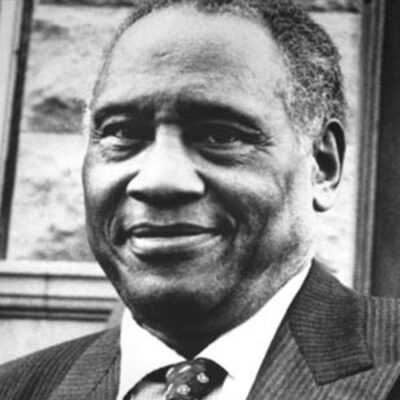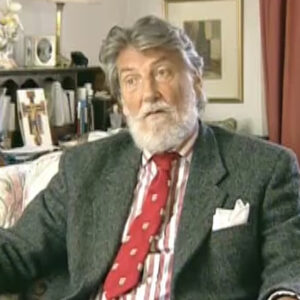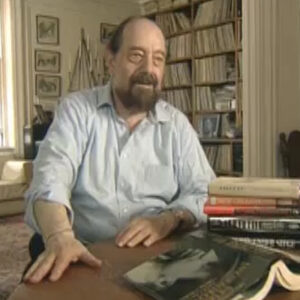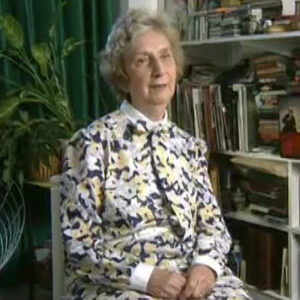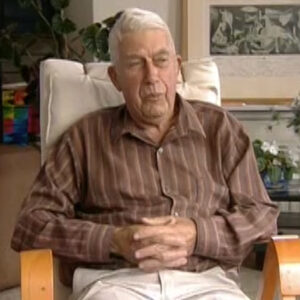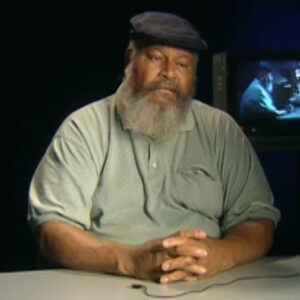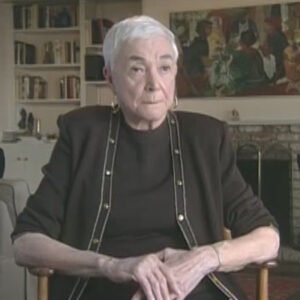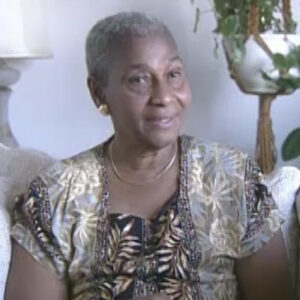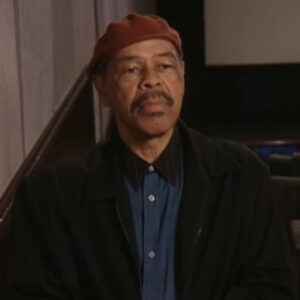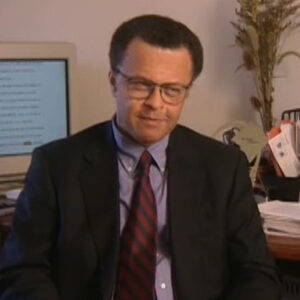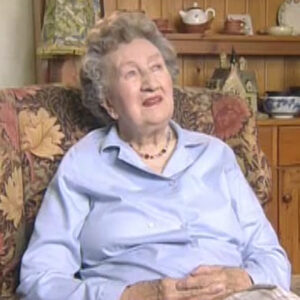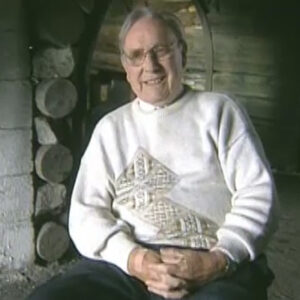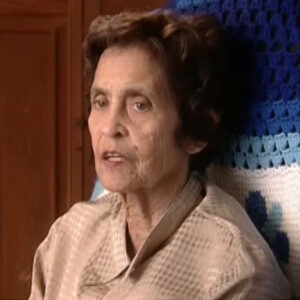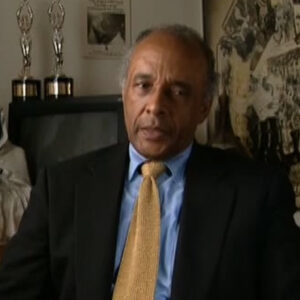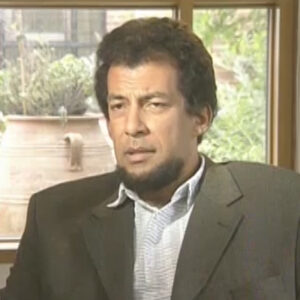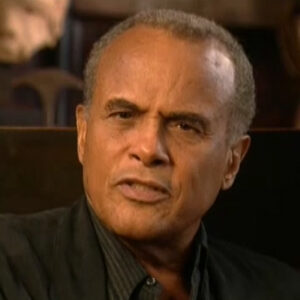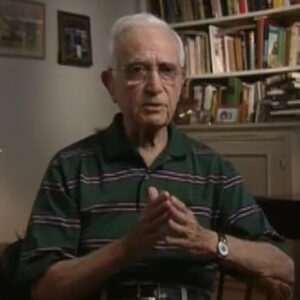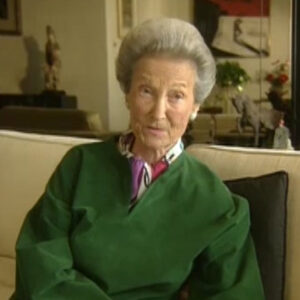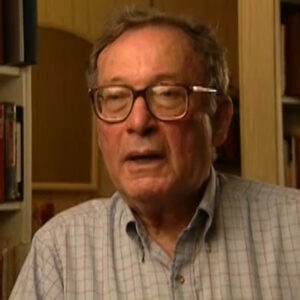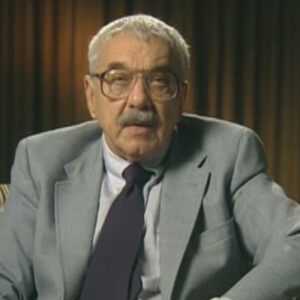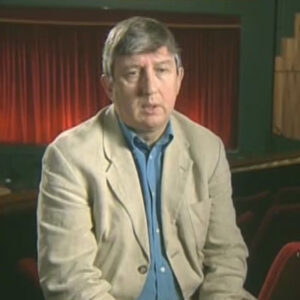Speaker OK, so you are telling me that you and your beginnings in the left went from the family?
Speaker No way. No, my beginnings on the left were from school because I had the good fortune or you you might say not such good fortune to have very progressive teachers at my school, which was in Britain in those days. It was called a grammar school, Coopers Companies School. And I was very speedily as a teenager recruit. I mean, I’m talking of the thirties of the Spanish Civil War period. I was born in 21, so I’d be about 15, 16, and I was very speedily recruited into the Labor Party League of Youth, which was the youth bit of the Labor Party. And then the guy called Ted Willis, who became a friend of Harold Wilson’s and Lord Ted Willis. He recruited me from the yellow light for the Young Communist League and my real political education began in the YSL theatre.
Speaker All right. OK, did you at what point did you begin to hear about virtually from the start?
Speaker Because he was when he came to Britain, there were everyone in the movement on the left in Britain wanted Paul to perform. And there was a guy from the musicians trade union, the EMU, called Harry Francis, who I knew very well, who, although he wasn’t even an intimate buddy, but he was a guy that one knew. And he rather fancied himself as Paul Robeson’s manager in Britain. So it all went through the union and through Harry Francis. And I went to it virtually. I was a fan. I didn’t follow him to South Wales. But wherever Paul performed in the London area, I would go and hear him.
Speaker And I know he was popular in the left. Yeah. What kind of reception do you think you got outside of them?
Speaker Well, I think the films made him popular in a wider section than than the pure left. I mean, when I say left, I don’t just mean the Communist Party or even the left of the Labour Party or the ILP or the trade unions. I mean, it was what we now call the broad left. But he was popular amongst the ordinary folk who went to see pictures and he saw films which ropes and may not have liked like Sanders of the river, but they were well attended, very well attended. Popular films. Yeah. And The Proud Valley. Am I moving too much?
Speaker Move your feet this way. I feel like that they could the clever you.
Speaker Speaking of Sanders of the river, what was that? What was the common sense of the river, given the fact that he espoused certain principles and acted in that way?
Speaker Well, he felt it was a sort of colonialist piece of work, the sort of imperialist production. And these politics were so well formed and well adjusted. By then, the Paul, I think, rightly felt that he was being taken for a sort of right. They were exploiting his voice. They were exploiting his colour and they were exploiting him. And I think he I think from the start felt uneasy on the set as the thing unfolded and when he saw the finished job, because you never know you’re in the film trade, so you never know when you’re filming what the finished job is going to look like. And I think he was quite upset, to put it politely, about the results of that film. And indeed, I believe truly we never discussed this, but I believe truly that it was only really happy with the film we made with the South Wales miners, the Proud Valley. He always said it and I believe him.
Speaker Yeah, I agree. Uh, did you know, see his wife? Yes. Very well. That.
Speaker OK, yeah, what was what was what was there what did you sense of the relationship and what she is political to you?
Speaker I think she was more political. I always sensed that she was more political. But I mean, that may be unfair to Paul’s memory. I don’t want to do that because he was a remarkable person. But I always thought she was incredibly politically alive. You must remember that I knew of her existence for years. But of course, it was Paul who I’d seen on the stage. I’d never seen her. But during the sixties, the mid 60s, when Paul’s illness was virtually early 60s at its height, and he went from hospital to hospital and ended up in 63 in East Germany, in Berlin, in Booke, the sort of posh clinic. And I had been making I’d done a lot of work doing English, making English versions of East German documentary films. It wasn’t my profession, but I did it because I supported the GDR, as it was called, German Democratic Republic, which of course was speedily gobbled up in the nineties, in the early nineties and in 63 in December, I was accidentally, not accidentally. I was in LA in the Schoenfeld airport. That’s the East German airport, East Berlin Airport. And I was approached by a friend of mine, a very serious friend of mine, Renata Milker, who was looking after Rabson while he was in East Germany. And she came up to me. She was in the airport. I was in the airport. She came up to me and said, Stanley, will you do me a very great favor? Paul had a slender Rabson. It’s like saying God was in the next room, are going home. They’re going back to Britain and they’re a bit worried about the journalists, the paparazzi at the London airport. And will you look after Paul in Islamabad? Harry’s here. But Parry, by that time was already you know, I wasn’t clapped out, but he was aging a bit and they wanted another body to look after Paul. But remember, I came up to Paul’s waist so I could hardly I was hardly his mind. But still, I agreed, you know, and said, well, are you sure? And all that stuff. And then I met him really for the first time off the stage and got to know him a bit. But remember, he’d been very ill. There’d been a suicide attempt. He’d been profoundly depressed. There were rumours which have never been no evidence has ever come to actual light that there were attempts to poison him. It’s in the same school of thought as the attempts to poison Fidel Castro. So and I think there may be well, history will his truth has a habit of coming out. It took 70 odd years with Stalin. It truth has a habit of coming out in the end.
Speaker And what was it like for you when you didn’t think.
Speaker Oh, yeah. So essentially. Well, I have a lot of questions.
Speaker Yeah, but the trip. Yeah. What was the trip like. Well it was well yes we talked a bit but he was subdued. I’m trying to be as accurate after it’s some years ago. We’re now in ninety eight and this was 63. So we’re talking a quarter of a century or so ago. More even and. He was dignified, he was, as we say, correct, and this slender who, by the way, was already ill and had been diagnosed as having terminal cancer by the time she met me, she, as it were, looked she looked after me and Paul will say it was a Polish lot plane. And in those days, the only way of easily going from London to East Berlin was on the Polish plane, which went Warsaw, East Berlin, London, London, East Berlin, Warsaw. And we were on this little lot plane and quite well looked after. And the journey was, I suppose, really eventful. Paul was fairly silent. He didn’t say a great deal, but he was friendly. He wouldn’t. He was a little anxious about what was going to happen at London Airport because it had bad experiences with journalists and paparazzo, remember? By the mid 60s, he’d been through a hell of a lot and he’d been virtually like he was under house arrest in the States, but he’d been locked up within America. Now, America’s a big place, you can argue, but he felt it keenly and they took away. I don’t mean they I don’t mean the American people. But being I mean, McCarthy and Co. took away the 10 best singing years of Robeson’s life, of his voice. And they were his best years. And of course, it was a loss not just to the British people are lost to the world that he was not allowed, but they’ve got his passport and he wasn’t allowed to perform. And that was a frightful thing to anyone but to an artist as sensitive. And there’s noble and as beautiful a human being as Robeson was. It must be an excruciatingly painful and I can understand his depression. I can understand his suicide attempt.
Speaker Well, you’re right again. Yeah.
Speaker What when you say you don’t understand, what precisely do you think causes depression? Are there any truth to the rumor? Did you feel that that the FBI or international forces poisoned the military?
Speaker Well, I wish I could produce some evidence for you, but I’d like to because it’s a convenient theory. But I think that all I can say, frankly, hand on my heart is that history will show whether the CIA made serious attempts to murder Paul Robeson. I can’t I can’t put any stronger or any weaker than that, and I can’t go around saying I can prove to you that they put this in his coffee or put there. I mean, after all, when when I mean, I’m going to divert when Tony Benn, who was a fanatical left wing British Labour MP, when Tony Benn fell ill and people said he’d been poisoned with too much tea because he was a passionate tea drinker, you know, drink tea from early morning to late at night and still does. There was a rumour that went round the left that the the British equivalent of the CIA, MI5 were trying to do in an uncomfortable left wing Labour MP Tony Benn. Tony Benn would be the last person to suggest that. But these things happen when prominent progressive people fall ill. But I can’t I can’t give you any serious evidence in the beginning.
Speaker See, when she first came, no one knew of her existence.
Speaker But I never met her the first time she met with the first time I really got to know her because we were in the same neighbouring seats for three hours and for some time before that at the airport and for some time after that, when we got him through to Marble Arch, he had a flat in marble out Connaught Place. And we got into London Airport and we got a taxi and took him from the airport to his home. And of course, he left for America within a couple of days of that. And that was the last time I saw him alive.
Speaker Do you have any feelings about.
Speaker The attempted suicide, I mean, is that a definite is that a definite event? I mean, can you talk about that?
Speaker No, no. I’ve discovered this by by reading about it, the Duberman book and other books and other people. And I mean one hesitate. You know, there is this theory that I’m not going to say Paul was a card carrying American communist because I don’t believe he was. He wasn’t. But there is this theory that progressive don’t commit suicide, but it’s belied by goes back to the poet Mayakovsky. I mean, I can quote a dozen people and I’ve lost wonderful friends who were Marxists, communists left for whom life got too much and they did themselves in. So I think I would give some credence to this theory that there was a suicide attempt.
Speaker They into.
Speaker OK, can you tell me about one thing? Yeah, the film Song of the Rivers.
Speaker Yes, yes. With great pleasure. Yeah, I have a lot to do with the English version of that film. And it was a very sensible decision because normally trade union internationals are not in the habit of taking sensible decisions about the media because in Britain anyway, the trade union movement is always one decade behind developments in the media. So trade unions are producing leaflets and booklets when they should be making TV commercials. However, the WTO, the World Federation of Trade Unions, someone there I don’t know whom said let’s get Joris Ivens to make a film about our trade union Congress. The big affair. People came from all corners of the Earth and Joris Ivens. Curiously enough, all these people are 100 years old this year, Rabson Ivens, Bertolt Brecht and so on and before.
Speaker Can you give me a list of the people and what they did on that?
Speaker Yeah, indeed. The Pleasure Jar Jar Ivens, the Dutch film director who had a great track record as a film maker. He made the film with the help of the East German documentary film studios. And sphagnum, one or two Germans helped him there. And they got they just went for the top mate and they won. They got Picasso, Pablo Picasso to do a poster. They got Dimitri Shostakovich to do the music. They did the direction and production. And they got oh, let me think, who who did the text of the song? No. Brecht. Bertolt Brecht. So you can’t lose, really, if you’ve got Bertolt Brecht, Shostakovich, Jarius and Robeson singing the song. But remember, we had a problem because Rabson was confined no passport to America. And thanks to the efforts of Robeson’s friend, who’s still around, still alive, Lloyd Brown, we were able to get Lloyd Brown and Paul Robeson Junior to record Rabson singing the Song of the Rivers. Every verse reflected a different river. There was a verse about the Yangtse and the Volga and the Mississippi as he went round. The World is a beautiful, beautiful, interesting song and I loved the film. We did the English text here. We had an English actor called Alex McCrindle from Scotland who had an English accent. And he the he he did the British text. It was fine. How was it received by the. Well, the tragedy was that we could never get any circuit. We could never get it. I never got it. Through the British Board of film censors, we had a lot there’s a long about half a dozen documentary films to be made about the troubles of British cinema with the British Board of Film censors because. Basically, when it was political, the censors stopped and famous films like Eisenstein’s Battleship Potemkin, my mentor, The Man Who Dragged me into the British film industry half a century ago over Montagu, had a hell of a time to get a certificate. Any showing? Oh, yeah. Potemkin was banned in Britain for many, many years and were shown privately through film societies and private people’s homes. So we had no luck in getting it through the censor. I mean, some of the rivers, we had no luck getting in anywhere through the censor. And in fact, it was widely shown within the movie, within the left movement. I would like to say it was widely shown within the British trade union movement. But that would be a lie because the British trade union movement didn’t seem to like films very much either. No, they didn’t seem to like Charlie Chaplin, but that was about the length of it. They didn’t go I don’t want to be insulting to my fellow trade union comrades and friends, but they never went for film shows and we had 16 mm. It was relatively easy, even in that period to show the film. We had a half dozen copies also on 16 mil. So we had no success, real success. But within the people, among the people who did see the film, they loved it. They loved it.
Speaker They were many people of many of our friends. And were you involved in the.
Speaker Campaign to get person’s passport?
Speaker Absolutely, yes, I have friends in I, I was very much involved because after all, we were the left’s distributors of progressive films in those days. You know, it’s the position has changed now, but we were virtually the only distributors of Russian documentaries in China. Remember, Russia and China were allies in this period. The division, the Krushchev era had emerged. And so we we had very little trouble in putting this stuff on.
Speaker When when Rosen got back. Yeah. Was his return well, by the general public, was it acknowledged as a political victory or was it just, oh, we’re glad to see him back?
Speaker No, it was a play with both Fabergé. They were glad to see him back and be they were it was a political victory. And there was a terrific campaign, particularly in Manchester. There was a special group up north in Manchester of Frank and Diana Lazaar. Both are now dead. But Diana Franklin’s his wife was a dear personal friend for many years. She ended up as a translator in East Germany in the GDR, and we became very close indeed. They led a campaign from Manchester for Robson’s passport to be returned, and they had all the trappings of a normal campaign leaflet, signatures, meetings, bring back, you know, unplayed records of ropes. And we had meetings. It was a good, good time. But of course, we failed. I mean, the fact is that Rabson was without a passport for, I think almost a decade, nine years anyway.
Speaker And I think it was fifty eight, fifty nine that the passport came back and frightful. Yeah. I have one point. So a complicated question. Yeah.
Speaker As West Indian immigrants came in to England.
Speaker Yeah. Yeah, yeah.
Speaker Were were attempts made by the left to bring them into a kind of a leftist perspective and who were they successful? And if so, they did roadsigns presence as a man of color. Did that help?
Speaker I think it helped a bit. There was an incredible woman called Claudia Jones who was booted out of America as part of the McCarthy witch hunt ended up here. I knew her not intimately, but I knew her fairly well and I heard her at meetings. Spellbinding speaker. She had founded the West Indian Gazette, which is spoken of affectionately by West Indian friends of mine, like Trevor Carter, the. And I wouldn’t like to I can’t give you specific statistical information, but I think that those West Indians that discovered ropes and found them very meaningful to their lives and to what it was about, after all, it was Britain. It was our country which invited the West Indians, the famous Windrush episode, which is half a century ago and which has been celebrated, if that’s the right word, quite recently this year, we invited people over because after the war, we were short of nurses and people and people to do don’t misunderstand me, people to do the dirty work. And we invited West Indians. It wasn’t slavery, but they they got the lousiest jobs. You know, wherever you if you went to a tube station, the person sweeping the floor tended to be a West Indian and so on. So they would have good reason, a lot of West Indians for feeling that perhaps Britain wasn’t a paradise with its streets paved with gold and all that stuff.
Speaker And so did the party try to and at the party, but the left movement, did they try to bring them into a political leftist perspective?
Speaker One tried.
Speaker Sorry, Behram, OK, I just turned my phone off.
Speaker Also, I’m wondering from your perspective, from the 30s, late 30s, yeah, yeah, was Paul Robeson his presence here at different times?
Speaker What was he used as a bridge, I know, within the walls?
Speaker He was, yeah, you know, in the 50s they knew about in the West Indies. Yeah, indeed.
Speaker When he got here was was where they both left and white left and black people combined.
Speaker Yeah. I don’t want to exaggerate the numbers of black people in the events because the left Britain always came late to these concepts. Certainly we cherished. I’m speaking now as a former British communist. You know, we cherished Negroes were precious to us, you know, every one of them and Asians and Indians and all the rest of it. But we had limited success. I know journalist Desmond Buchel and others who who were very much on the left, but I wouldn’t like to suggest that it was a sort of 50/50 balance because it wasn’t about where they where they turned up. They were passionately enthusiastic about Paul.
Speaker Paul was a world, you know, for us. On the left, we had a few icons. Paul was one, the so-called red dean of Canterbury was another, the wonderful churchman, very dramatic figure like Trevor Huddleston in relationship to the anti-apartheid struggles for Nelson Mandela in South Africa. But we didn’t have that many. We had a number of outstanding women, comrades and friends. But, you know, we were finished on the ground. But by and large, by and large, they were wonderful days. And I frankly, I miss the Illan and the enthusiasm. I mean, the Emperor Stadium, that would be about 7000 people. It’s sort of unheard of in British politics to gather more than a couple of thousand people in one place, Trafalgar Square demonstrations. You know, Rabson made those demonstrations. If you put Robeson’s name on the poster ropes and sing you your success, well, it was guaranteed. You knew that you couldn’t go wrong. You could like getting. I was going to say like getting Larry Adler. No, just as good. And and then some, you know, I’m sure Larry would be the first person to agree that we didn’t have too many stars on our books in those days. And of course, we never had the fame. We had never had the reputation of having too many film stars in Britain who identified with the left. You know, there were there were small half a handful maybe.
Speaker First off, we understand. Yeah, let’s do a couple of clicks on that thing you just want. Yeah. Can you pull the plug so that one of the monitors says, yeah, this is.
Speaker Yeah, OK. OK. Oh, OK. Hello. What’s wrong?
Speaker Oh yeah, ok, I’m a few minutes here. OK. OK, quickly. Um did you see. We did see Showboat.
Speaker No, I never saw Sholder saw the film. Of course I didn’t see him on the stage and showboat but I became a friend of Dame as she became Dame Peggy Ashcroft who played with ropes. And of course she’s alas, she’s no longer on this earth like so many of my friends at my age. But she had a profound affection and love for ropes, without a doubt. And we had that had mutual friends who were friends of Peggy Ashcroft, people like the actor Mark Dignam, who played secondary roles. Then we were famous, you know, but he was an actor of depth and he was had a good relationship with Dame Peggy.
Speaker I mean, on dozens of documentaries, Mark Dignam and he, too, had an affair with Dame Peggy Ashcroft that came out in her biography. But for God’s sake, the last thing I want to give you impression is that Peggy Ashcroft, one of our greatest actresses, was a tart or a whore. She wasn’t. She just had an affair, as did indeed Comtesse want not, you know, Mountbatten’s Mrs Edwina Mountbatten. But this might have been what we used to call in the Army a one night stand, you know, but these things happen if a human being lives a life, you know. You know, Paul was actually rather fond of girls and women. Yes, indeed. But it probably didn’t hurt his popularity, it didn’t hurt his popularity. I had a feeling with Islan that she had learned to sort of tolerate or somehow accept Paul’s character for what it was.
Speaker Yeah, there was one person. Yolan Jackson. Yeah. Oh. So from all we’ve heard, yeah, yeah, yeah, that was the one that was the one thing that Paul probably said, Oh, this is it.
Speaker Yes, indeed I read that. I read that. And it must be true. I think I think it’s true. Islam. There was a camera sort of. Yeah, yeah. There was a lot of people. Lloyd Brown called her a rather cool person that he never met very many people with affection for robes. And but I’m I am in the other school of thought. I thought perhaps she was somewhat misunderstood. Perhaps some of the women around Rabson were jealous of the fact that, you know, she was his wife. But me, I personally thought she was a woman of great charm and dignity. And I remember we when she was a journalist, among other things, at the United Nations, and I remember she produced a pack of like a magician, a pack of cards of her various the various bits and pieces which took her into that this bit of a U.N. building and that bit of the UN building. And she was very open with me. She was I wouldn’t say she was flirtatious. She was unwell, but she was lively, but much livelier than Paul on that journey home. OK, anything else you want to say in general, I only want to say one basic thing. You know, we haven’t had many heroes and I think the age of heroes is past. But in terms of other, I’ve lived through much of the 20th century, two years, and it will be it will be at the end of the 20th century. But for me and I have known hundreds and hundreds of people. And one thing about being on the left in Britain, you do see, among others, you see the best of people. You see the worst the people in the best of people. And for me. Rabson, Nelson Mandela, you know, they are very special names in history and they will remain so I think in terms of the Negro people, the Negroes have never had and will never had such a remarkable representative on so many fronts because he was multifaceted. There were so many aspects of Robeson’s character. It wasn’t just that you had this wonderful voice. He introduced me to the poems of William Blake, for example, a little poem of Blake called The Little Black Boy. I won’t bore you by reciting it, but that opened up my eyes that he was William Blake wrote poems and I got books out of the library and so on and. Musician, profound thinker about music, the way he was able to link folk music with classical music, that he found the basic roots in music and why the secret of why music affects people so much. Now, he was he was all I can say was a wonderful man and privilege. And, you know, I’ve not had you know, I’m not that famous. I’m not well known, but I’m not famous. But I have had the honor. Of knowing that man and his wife and I will never forget them, never, ever.

